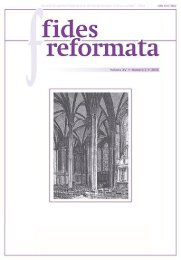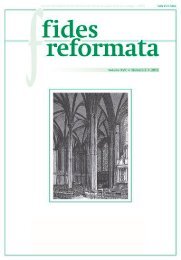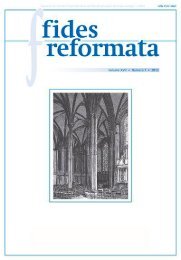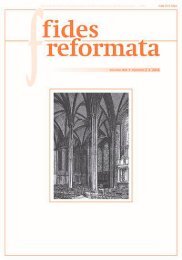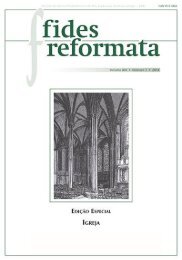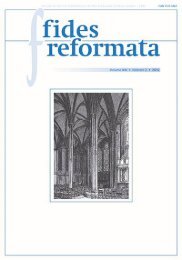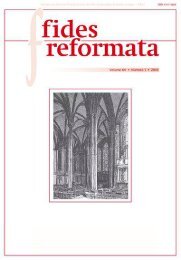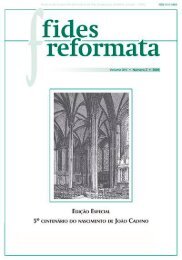Fides 18 N2 - Revista do Centro Presbiteriano Andrew Jumper
Revista Fides Reformata 18 N2 (2013)
Revista Fides Reformata 18 N2 (2013)
You also want an ePaper? Increase the reach of your titles
YUMPU automatically turns print PDFs into web optimized ePapers that Google loves.
FIDES REFORMATA XVIIi, Nº 2 (2013): 99-115<br />
Original Righteousness<br />
Ralph F. Boersema *<br />
abstract<br />
Understanding Christian justification starts with Adam’s righteousness<br />
at creation, righteousness that was integral to the image of God. He was not<br />
called to attain righteousness through performance of works, but to preserve the<br />
right-standing he received as a gift at creation. Had he not sinned, his obedience<br />
would have maintained and testified to this righteousness. The Bible <strong>do</strong>es not<br />
teach a distinction between innocence and righteousness. For Adam, righteousness<br />
was not a commodity to be produced in order to earn right-standing or<br />
eternal life. Right-standing was his from the beginning, even though it could<br />
be lost through unfaithfulness to the Lord. Entitlement to eternal life was his<br />
through sonship and would become his, by sight, when man’s work on earth<br />
was completed and the mandate to fill the earth and subdue it was fulfilled.<br />
The probation was not a means of attaining justification. Adam was counted as<br />
righteous from the beginning. Instead, the probation was intended to serve as a<br />
means for spiritual growth, as happened in Jesus’ life. To correctly understand<br />
justification the right order must be observed. One must be righteous before<br />
he can perform righteousness and not the other way around. Adam’s original<br />
righteous obedience was not that of works without faith. In true righteousness,<br />
faith and works are joined. When the New Testament contrasts faith and works,<br />
* The author was born in 1949 in the Netherlands and immigrated to Canada with his family in<br />
1951. He obtained his M.Div. and Th.M. degrees from Westminster Theological Seminary, in Philadelphia.<br />
He was ordained by the Canadian Reformed Church in 1973 and served as a missionary in Brazil for<br />
21 years (1979-2000). His <strong>do</strong>ctoral studies at the University of South Africa were interrupted due to a<br />
serious illness in his eyes. Currently he lives in Bristol, Virginia, and is the president of the International<br />
Reformed Theological College. He has authored several articles and the book Not of Works: Norman<br />
Shepherd and His Critics, NextStep Resources (2012). This article is a chapter in the book: SANDLIN,<br />
P. <strong>Andrew</strong>; BARACH, John (Eds.). Obedient Faith: A Festschrift for Norman Shepherd. Mount Hermon,<br />
California: Kerygma Press, 2012.<br />
99





